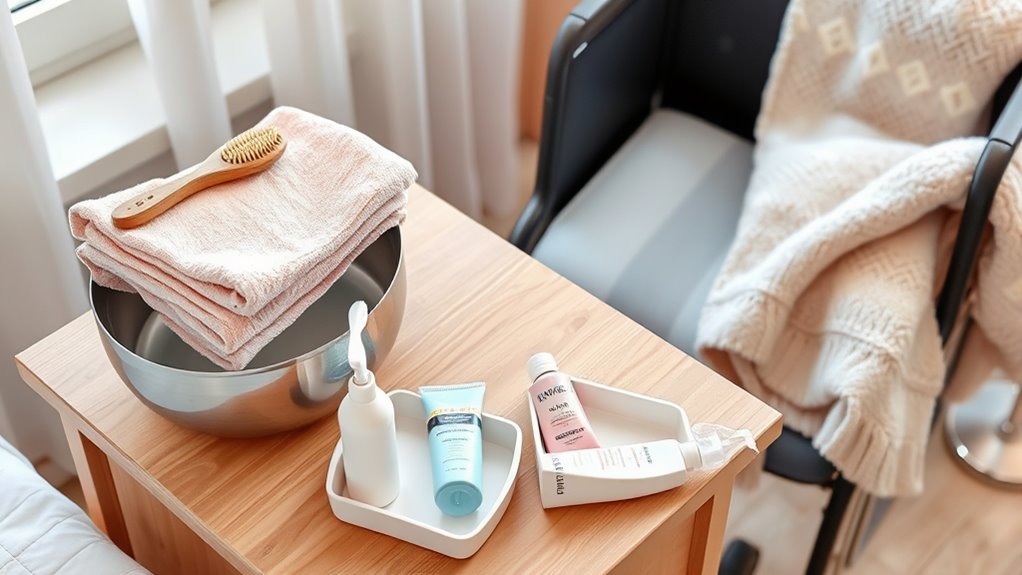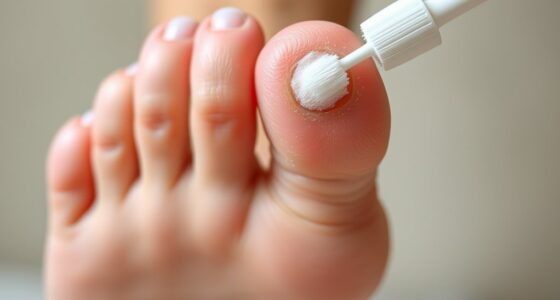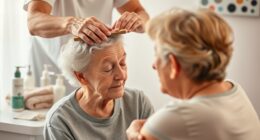To care for a bed-bound senior’s hygiene, follow a detailed routine: check and protect their skin from pressure sores, clean gently with mild soap, and keep skin dry and moisturized. Attend to oral hygiene, wash hair carefully, and handle incontinence with special products. Change bedding and clothing regularly, and monitor legs and feet for signs of trouble. Maintaining these practices helps ensure comfort and health—continue exploring for more helpful tips.
Key Takeaways
- Regularly inspect skin for pressure sores, redness, irritation, and keep skin moisturized to prevent breakdown.
- Use gentle cleaning with mild, pH-balanced products, thoroughly dry skin, and maintain proper perineal hygiene.
- Reposition the senior every two hours and promote circulation with gentle massage and elevation.
- Maintain oral and hair hygiene with soft brushes, mild shampoos, and regular scalp massage.
- Change bedding and clothing frequently, using breathable incontinence products and proper hygiene practices.
Daily Skin Care and Inspection

Maintaining daily skin care and inspection is essential to prevent skin breakdown and infections in bed-bound seniors. Regularly checking the skin helps you catch early signs of redness, irritation, or pressure areas. Focus on areas vulnerable to bedsores, such as hips, heels, and elbows. Implement bedsores prevention by repositioning your loved one frequently to reduce sustained pressure. Moisture control is also vital—use gentle cleansers and keep skin dry to prevent irritation and bacterial growth. Apply moisturizers to maintain skin elasticity, especially in dry or sensitive spots. Keep an eye out for any changes or discomfort, and address issues promptly. Consistent skin care and vigilant inspection are your best tools for maintaining healthy skin and preventing complications. Utilizing data-driven strategies can help monitor and improve skin care routines effectively.
Oral Hygiene Routine

Have you established a consistent oral hygiene routine for your loved one? Ensuring good oral care is essential for their health and comfort. Start by choosing a soft-bristled toothbrush to protect delicate gums and prevent irritation, practicing proper toothbrush safety. Gently brush their teeth twice daily, covering all surfaces, including the tongue. When selecting a mouthwash, opt for alcohol-free options to avoid dryness and irritation. Mouthwash can help reduce bacteria, freshen breath, and promote oral health. Be mindful of their specific needs, such as sensitivities or medical conditions, and adjust the routine accordingly. Regularly inspect their mouth for signs of sores, redness, or other issues, and consult a dentist as needed. Consistency in oral hygiene helps prevent infections and maintains overall well-being. Celebrity lifestyle insights have shown that maintaining routine habits can significantly enhance quality of life for seniors.
Hair and Scalp Care
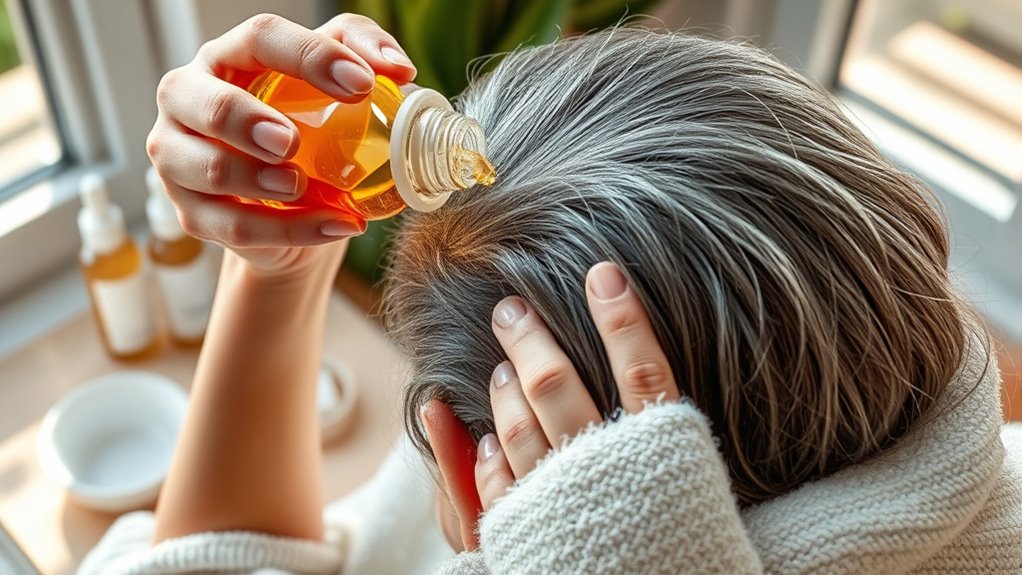
After establishing a thorough oral hygiene routine, paying attention to hair and scalp care helps guarantee your loved one’s overall comfort and health. Gently massaging the scalp stimulates blood flow and promotes relaxation, making hair care more effective. Use a soft brush or your fingertips to perform a calming scalp massage daily. When it comes to hair styling, opt for simple, gentle styles that don’t pull or tug on the hair, reducing breakage and discomfort. Keep the hair clean by washing it regularly with a mild shampoo suited for their hair type. Be sure to dry the hair thoroughly to prevent scalp irritation. Regular scalp massages and careful styling contribute to healthier hair, improved comfort, and a boost in your loved one’s overall well-being. Incorporating hair and scalp care into your routine also supports overall health, especially for individuals with limited mobility.
Perineal and Incontinence Care
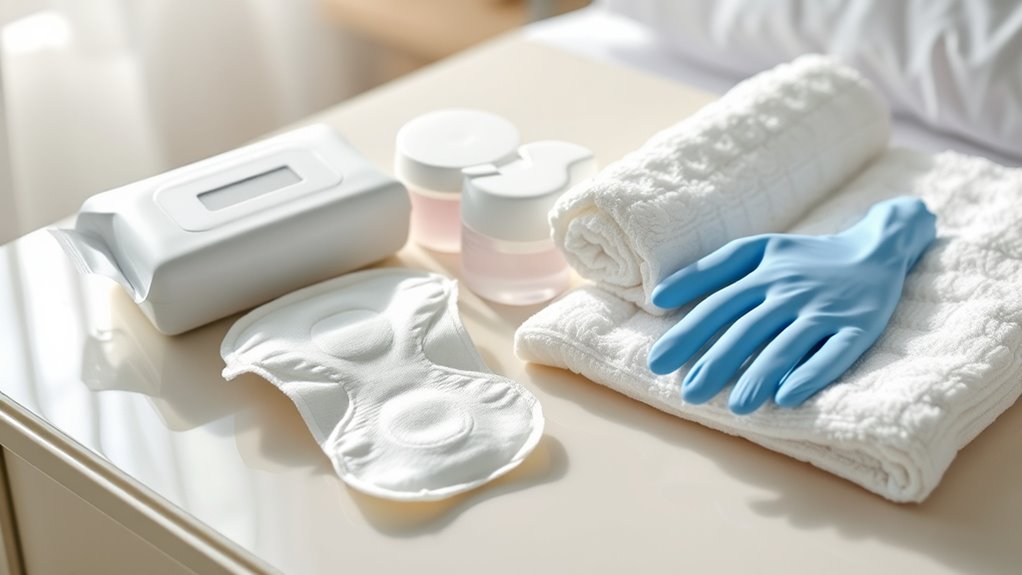
Taking care of the perineal area requires gentle skin cleaning techniques to avoid irritation. Managing incontinence products properly helps prevent skin breakdown and discomfort. By staying attentive to skin condition, you can effectively prevent irritations and maintain your loved one’s comfort. Remembering the importance of love and support can also make a significant difference in caregiving. Fathers’ guidance and emotional presence play a vital role in fostering trust and reassurance during personal hygiene routines.
Gentle Skin Cleaning Techniques
How can you guarantee that skin cleaning for bed-bound seniors remains gentle and effective? Start by using mild, pH-balanced cleansers to maintain the skin’s natural pH balance, reducing irritation. Always use lukewarm water and soft cloths or sponges, avoiding scrubbing. Pat the skin dry carefully, especially around sensitive areas. Incorporate moisturizing routines afterward to keep the skin hydrated and resilient. When cleaning the perineal area, focus on gentle motions to prevent discomfort or damage. Avoid harsh soaps or aggressive rubbing, which can compromise skin integrity. Maintaining a gentle touch and using products formulated for sensitive skin helps prevent irritation and breakdown, ensuring a comfortable experience while supporting your loved one’s skin health. Additionally, understanding contrast ratio can help you select products that are less likely to cause visual discomfort or overstimulation, further promoting overall skin and sensory comfort.
Incontinence Product Management
Proper incontinence product management is essential for maintaining your loved one’s skin health and comfort. Regularly changing incontinence products helps prevent moisture buildup that can lead to bedsores, especially in vulnerable areas. Always check the fit—an ill-fitting pad or diaper can cause chafing and skin irritation. When removing soiled products, dispose of them promptly and safely to avoid odors and contamination. Be sure to wash your hands thoroughly afterward. Using breathable, moisture-wicking products can help keep skin dry and reduce the risk of infection. Keep a supply of clean, correctly sized incontinence products nearby for quick changes. Additionally, selecting products with skin-friendly materials can further protect delicate skin. Consistent, careful management of incontinence products is key to preventing skin breakdown and ensuring your loved one’s comfort and dignity.
Preventing Skin Irritations
To prevent skin irritations in bed-bound seniors, it’s essential to maintain a clean and dry perineal area. Proper moisture control reduces the risk of skin breakdown and helps with bedsores prevention. Regularly check for signs of redness, irritation, or dampness, and change incontinence products promptly. Gentle cleansing with mild, fragrance-free wipes or water prevents irritation, followed by thorough drying. Using barrier creams can protect sensitive skin from moisture and friction. Consider repositioning your senior every two hours to avoid prolonged pressure. Additionally, ensure bedding is clean, dry, and free of wrinkles that can cause friction or pressure points. These practices help maintain healthy skin and reduce the likelihood of skin irritations. Incorporating evidence-based practices can further enhance skin care routines and prevent complications.
Hand and Nail Maintenance
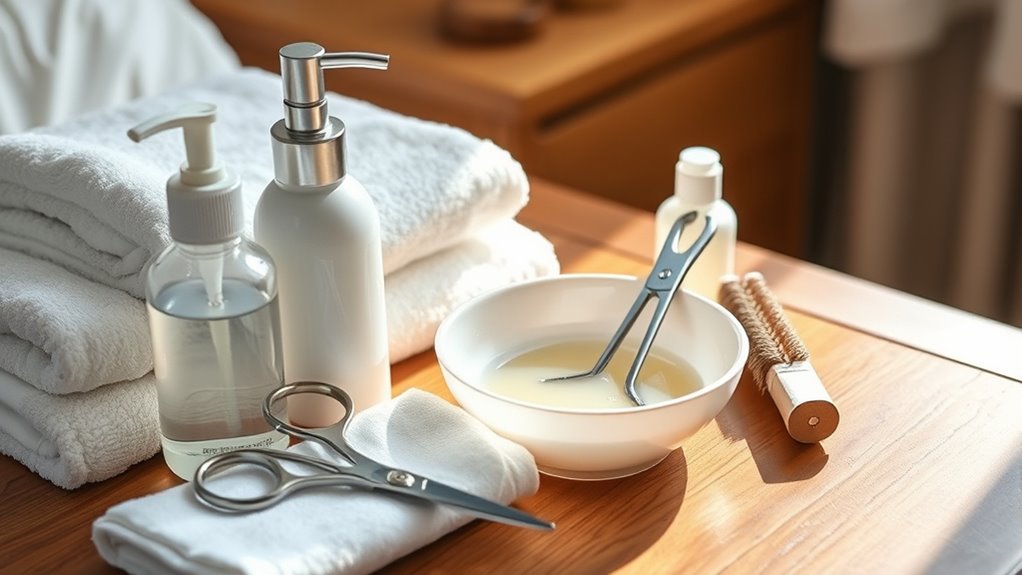
Maintaining clean and healthy hands and nails is essential for preventing infections and ensuring comfort for bed-bound seniors. Regular nail trimming helps avoid ingrown nails and reduces dirt accumulation under the nails. Use clean, sanitized tools and trim nails straight across to prevent injury. After trimming, apply hand moisturization to keep skin soft and prevent dryness or cracking, which can lead to infections. Be gentle around sensitive areas and avoid cutting nails too short. Encourage frequent hand washing with gentle soap to remove dirt and germs. Proper hand and nail care not only promotes hygiene but also helps prevent discomfort and skin issues. Incorporating professional voiceover techniques into education and training can enhance caregiver communication about hygiene practices. Consistent attention to these steps supports overall health and well-being for seniors confined to bed.
Foot and Leg Care
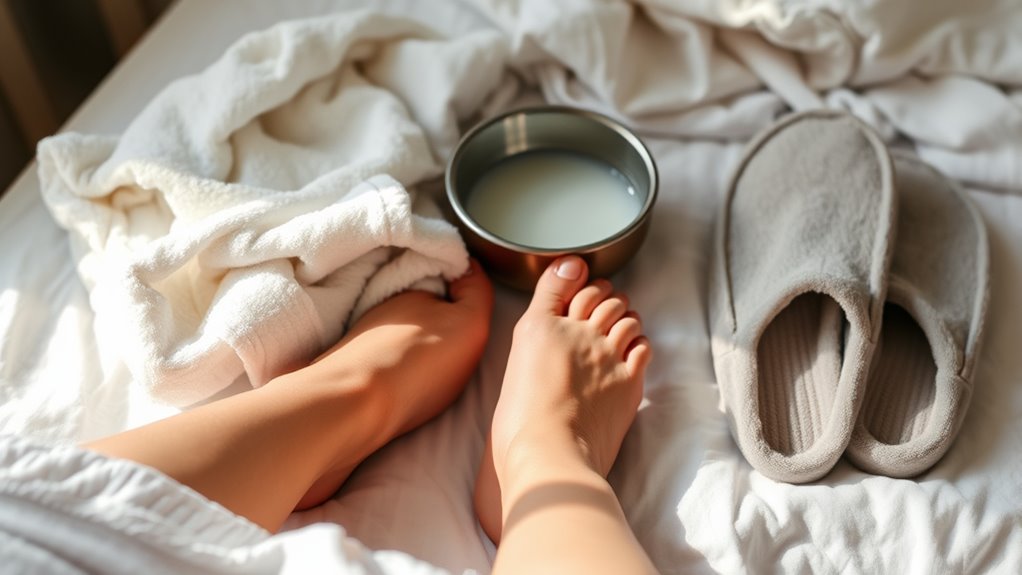
Taking care of your loved one’s feet and legs is essential to prevent complications. Regularly inspect the skin for signs of redness, sores, or swelling, and use proper washing techniques to keep the area clean. Additionally, promoting good circulation can help avoid circulatory issues that often affect bed-bound seniors. Using specialized air purifiers can improve indoor air quality, reducing irritants that may affect skin and respiratory health.
Skin Inspection Tips
Regularly inspecting your loved one’s feet and legs is essential to catch any problems early. Look for signs of pressure ulcers, redness, or swelling, especially over bony areas. Check for skin discoloration, cuts, or blisters, which can develop quickly in bed-bound seniors. Ensure the skin remains well-hydrated, as dry skin increases the risk of tears and infections. Keep an eye out for any warmth or unusual odors that may indicate infection. Use a gentle touch and good lighting during inspections. Regular skin checks help prevent serious complications and promote comfort.
- Examine for signs of pressure ulcers and skin breakdown
- Assess skin hydration levels regularly
- Look for any discolorations or open wounds
- Check for swelling, redness, or warmth
- Document any concerns for prompt action
Proper Washing Techniques
When washing your loved one’s feet and legs, it’s important to use gentle, lukewarm water and mild, fragrance-free soap to prevent skin irritation. Use just enough water to cleanse thoroughly without excess, helping with water conservation. Gently wash each area, paying attention to between toes and around nails. Rinse well to remove soap residue, which can cause dryness or irritation. For added protection, consider using antibacterial soaps occasionally, especially if there’s a risk of infection. Be careful not to scrub too hard, and dry the skin completely afterward, especially between toes. Proper washing techniques help maintain skin integrity, reduce bacteria buildup, and promote comfort, all while conserving water and avoiding unnecessary skin damage. Additionally, understanding the importance of skin health can guide caregivers in providing the best care for their loved ones.
Preventing Circulatory Issues
To help prevent circulatory issues in your loved one’s legs and feet, maintaining good blood flow through proper care is vital. Poor blood circulation can lead to pressure ulcers and swelling, increasing infection risk. Regularly check for signs of pressure buildup, and encourage movement whenever possible. Elevate the legs to reduce swelling and promote circulation, but avoid cutting off blood flow. Use gentle massaging techniques to stimulate blood flow, and keep the skin clean and dry to prevent breakdown. Properly positioning your loved one helps avoid pressure points that hinder circulation.
- Encourage small, frequent leg movements or repositioning
- Elevate legs above heart level when resting
- Use supportive footwear or compression stockings as advised
- Keep skin moisturized to prevent dryness and pressure ulcers
- Regularly inspect legs and feet for changes or pressure spots
Clean Bedding and Clothing Management
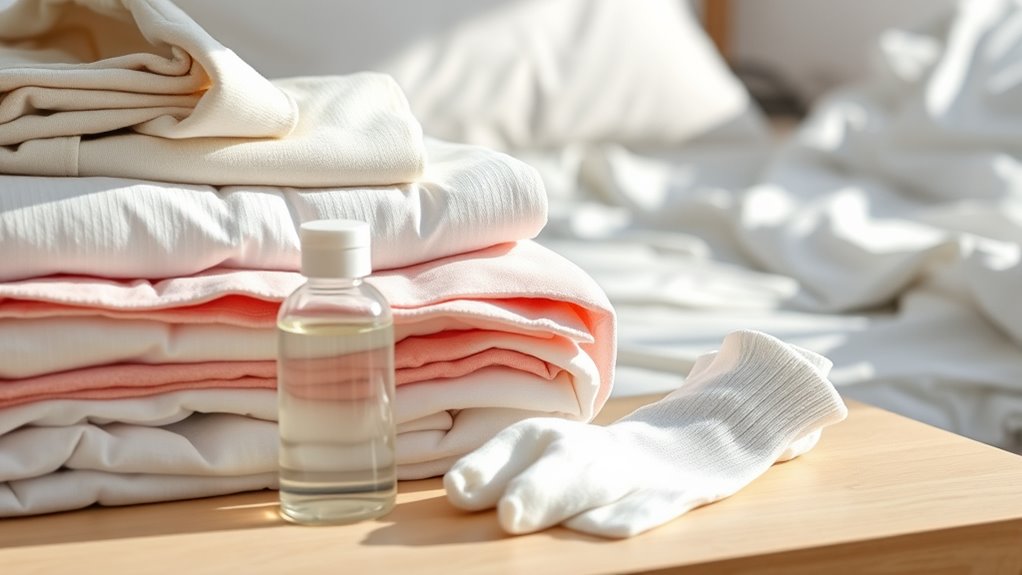
Maintaining clean bedding and clothing is essential for preventing infections and ensuring comfort for bed-bound seniors. Proper laundry organization helps you keep track of clean and dirty items, making laundry routines more efficient. Regularly changing bedding maintains bedding freshness, which reduces the risk of skin infections and irritations. Use a designated laundry area to separate soiled items and prevent cross-contamination. Wash bedding and clothing with appropriate detergents and at proper temperatures to eliminate germs effectively. Fold and store clean items neatly to avoid clutter and make daily changes easier. By staying organized and committed to timely laundry routines, you promote a healthier, more comfortable environment for your loved one, supporting their overall hygiene and well-being.
Frequently Asked Questions
How Often Should I Change Bed Linens for Optimal Hygiene?
You should change bed linens regularly to maintain ideal hygiene. Typically, laundry frequency depends on your comfort and health needs, but it’s recommended to change sheets at least once a week. If you or your loved one experience sweating or accidents, change linens more often. Proper linen maintenance helps prevent infections and keeps the sleeping environment fresh. Staying consistent with linen changes ensures a clean, comfortable space, promoting better overall hygiene and well-being.
What Are Signs of Skin Infections to Watch For?
Imagine your loved one’s skin as a battlefield—any redness, swelling, or pus signals signs of infection. Watch for persistent skin irritation, warmth, or unusual spots that don’t fade. These signs of infection can escalate quickly if ignored, so stay vigilant. Regularly check for changes, and if you notice any, seek medical advice promptly. Keeping an eye on these clues helps prevent serious complications and keeps your senior comfortable.
How Can I Prevent Bedsores Effectively?
To prevent bedsores, focus on pressure ulcer prevention by regularly changing your loved one’s position to relieve pressure points. Use skin hydration strategies, like moisturizing the skin daily, to maintain skin integrity. Confirm they sit or lie on cushioned surfaces, and encourage gentle massages if appropriate. Regular skin checks help catch early signs, and good nutrition supports overall skin health, reducing the risk of sores developing.
Are There Special Products Recommended for Sensitive Skin?
Think of caring for sensitive skin as tending a delicate garden. You should use gentle cleansers and hypoallergenic products to keep it healthy. These products are designed to minimize irritation and protect fragile skin. Always choose items free from harsh chemicals or fragrances. Regularly check for redness or irritation, and adapt your routine to keep your loved one’s skin safe and comfortable, just like nurturing a precious flower.
How Do I Encourage Seniors to Cooperate With Hygiene Routines?
To encourage seniors to cooperate with hygiene routines, use motivational techniques like positive reinforcement and gentle encouragement. Effective caregiver communication is key—speak calmly, listen to their concerns, and involve them in the process. Show empathy and patience, making routines feel less like chores. By building trust and offering reassurance, you help seniors feel more comfortable and willing to participate in their hygiene care willingly.
Conclusion
By following this personal hygiene checklist, you’re tending to your loved one’s comfort and dignity like a gentle gardener nurturing delicate blooms. Each task is a drop of sunlight, helping their well-being flourish even in stillness. With tender care and attention, you create a safe, soothing haven where health and comfort blossom together. Your dedicated hands are the steady roots supporting their peace of mind, turning daily routines into acts of love that truly make a difference.
